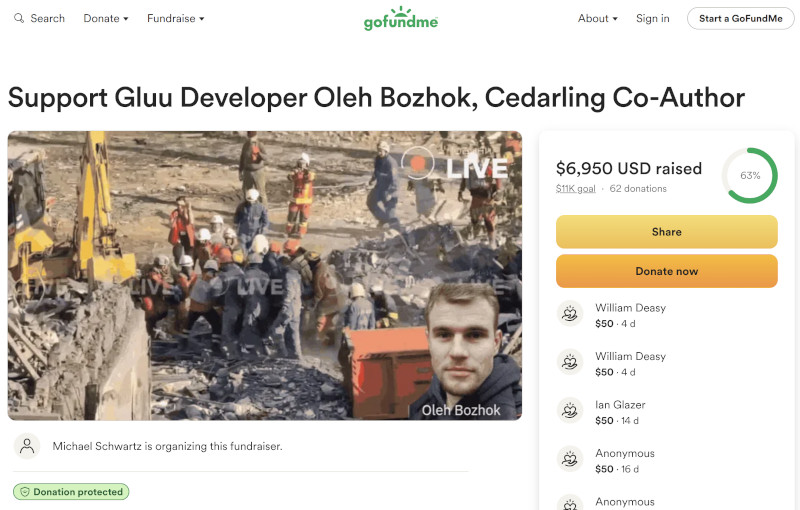
A talented open source contributor survives a ballistic missile strike in Kyiv
Like many companies in the open source community, Gluu’s success depends on people—we hire the most talented engineers, wherever they’re located. In open source, geography doesn’t matter. Since we were founded in 2009, we’ve always employed Ukrainian team members who were critical to our success. Like many software vendors, we’ve benefited from Ukraine’s talented, hard working engineers.
One of those talented engineers is Oleg Bozhok, a 29-year-old developer from Kyiv, Ukraine. He joined Gluu on August 15 last year, recruited to lead the rewrite of a new embeddable policy engine called “The Cedarling,” which uses Amazon’s Cedar language for blazing-fast authorization. His job was hard: re-design the Cedarling based on Gluu’s design and past iterations. We were chucking the old code, and opting for the dreaded “ground-up re-write.”
To his great credit, and of course with the help of many other Gluu team members, Gluu shipped the MVP of The Cedarling in April. Consistently since August, Oleg averaged one commit every three days. He also mentored teammates, helped with code reviews, and fought to progress pull requests to the finish line. He’s an ideal open source contributor.
In April, he took a well-earned vacation. He and his wife, Darina, stayed home in Kyiv. They spent time tending an indoor garden. I know this because my son tutors Oleg in English, and I was hearing about the various botanical tech deployed to assist some very spoiled tomatoes and peppers.
In the early hours of April 24, tragedy struck. A Russian ballistic missile hit the residential building where they lived in Kyiv’s western Svyatoshynskyi district. According to emergency services, it was one of the hardest-hit areas of that night’s attacks.
Oleg and Darina had retreated to the corridor of their apartment—a common civilian response when there’s not enough time to reach a shelter. Oleg was just a meter away from Darina, bent over his phone, when the missile hit. The building collapsed.
Miraculously, Oleg survived. A fallen ventilation pipe created a pocket of space, allowing him to breathe. After more than seven hours trapped beneath rubble, he was pulled out alive by rescuers. He was bruised and badly injured, but conscious.
Darina did not survive.
The morning after, we pieced together what happened through calls, hospital reports, and news stories. Two local Ukrainian news outlets wrote tributes to Darina, describing her warmth and generosity. Oleg’s mother, who rushed to the hospital, said she was grateful beyond words that her son was alive—but devastated by the loss.
As a company leader, as a member of the open source community, and simply as a human being, this has been one of the hardest events I’ve witnessed. We often speak about the global nature of open source as an abstract strength—diverse minds, 24/7 progress, ideas shared freely across continents. But moments like this make that globalism heartbreakingly real.
Oleg is now recovering. The road ahead is long. His injuries are serious and may require further medical treatment. The emotional toll will take even longer to heal. He has lost not just his home and health—but his wife, his future.
To support Oleg, we’ve launched a GoFundMe campaign to provide a financial cushion as he rebuilds his life. 100% of the funds go directly to him. It’s a small gesture, but it’s what we can do to show that in open source, we support our community.
The international open source community stands on the shoulders of contributors like Oleg—talented, generous individuals who build essential infrastructure in times of peace and war alike.
Oleg’s story is a reminder that open source is not insulated from global conflict. The contributors behind our projects live in cities under siege, walk streets filled with air raid sirens, and bear the mental burden of uncertainty every day. Supporting them means more than merging their pull requests—it means showing up when life crashes down.
Oleg will return to open source when he’s ready. Or maybe he won’t… that’s up to him. Whatever he decides to do, we’ll be grateful for his recovery, inspired by his strength, and more committed than ever to the kind of collaboration that brings people together, even in the darkest of times.
Author:
Michael Schwartz, CEO, Gluu
Michael Schwartz is the founder and CEO of Gluu, an open source security company. He is an advocate for open standards and community-driven software development, and hosts the “Identerati Office Hours” livestream on digital identity and security.
Related links:
https://vechirniy.kyiv.ua/news/111653/
https://www.obozrevatel.com/zhizn-stolitsyi/napolnyala-vse-vokrug-teplom-i-zabotoj-v-kieve-v-rezultate-obstrela-rossii-pogibla-27-letnyaya-darya-bozhok-foto.htm





